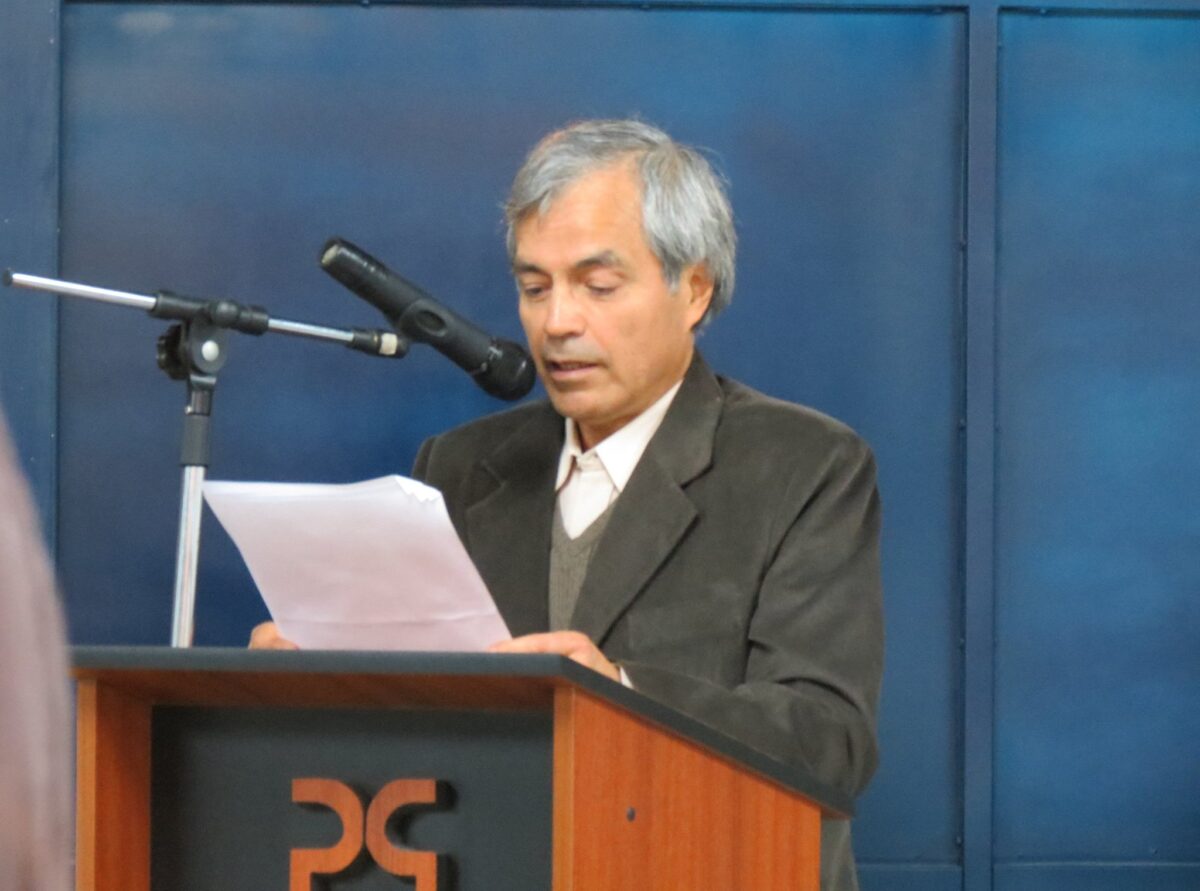Oswaldo Encalada Vásquez (Cañar, 1955) is a philologist, writer of both fiction and children’s literature, and an academic. His substantial contributions to the field of linguistics and literature earned him the prestigious “Fray Vicente Solano” award, conferred by the Municipality of Cuenca on October 18, 2004. This recognition underscores his significant influence and standing in Ecuador’s intellectual and cultural domains. Throughout his career, Vásquez has served in notable positions, including professorships at the Universidad de Azuay and the Colegio Manuela Garaicoa de Calderón. Additionally, he is a distinguished member of the Ecuadorian Academy of Language, further testament to his respected status in the academic world.
Early Life and Academic Achievements
Oswaldo Encalada Vásquez, born in 1955 in Honorato Vásquez, a municipality in the coastal region of Marabí, Ecuador, stands as one of the most prominent figures of Ecuadorian intellectualism and literature in the late 20th and early 21st centuries. A dedicated scholar from a young age, Encalada pursued higher education in Letters, ultimately earning his doctorate in Philology from the University of Cuenca, the capital of the Azuay province. He further specialized in university teaching at the University of Azuay.
Teaching Career and Literary Critique
As a university professor, Encalada spent many years teaching Literature in the Philosophy Faculty of the University of Azuay. He also taught at the Manuela Garaicoa de Calderón school. His literary critiques and language studies have graced several esteemed cultural publications in his environment, such as El Guacamayo and La Serpiente (Casa de la Cultura de Cuenca), Núcleo (Azuay), and Cultura (Central Bank of Ecuador).
Literary Contributions and Recognition
His contributions to literature have not gone unnoticed; Encalada was honored with the “Fray Vicente Solano” award by the municipality of Cuenca on October 18, 2004, recognizing him as one of the most notable citizens. His linguistic studies and erudite works include the monumental “Toponimias” (2003), a five-volume study on the origin and evolution of the names of Ecuadorian towns and cities, and “Diccionario de Artesanías” (2003). His work “Modismos cuencanos” (1990) provides a unique inventory of the jargon of various social and professional groups in Cuenca.
Distinctive Narration and Storytelling
As a writer, Encalada excels in the intricate genre of short narrative, contributing brilliant collections of stories such as “Los juegos tardíos” (1980), “La muerte por agua” (1980), and “El día de las puertas cerradas” (1988). His narratives, which have been featured in renowned collective showcases, have solidified his position as one of the foremost contemporary Ecuadorian storytellers.
Francisco Proaño Arandi, a fellow writer and literary critic, describes Encalada’s narratives as providing a clear, uncompromising view of the world, offering a serene reconstruction of the Andean rural landscape from the perspective of recollection and memory. His storytelling captures not just the landscape but also the mythical universe of childhood with its frustrations, obsessions, and cruelties.
Other Works
Other notable works by Encalada Vásquez include “A la sombra del verano” (1991), “La signatura” (1994), “Salamah” (1998), “Diccionario para melancólicos” (1999), “Crisálida” (2000), “Bestiario razonado & Historia natural” (2002), “Imaginario” (2002), “Palabra derramada. (Breve antología personal)” (2004), and “El jurupi encantado” (2004). “El jurupi encantado” is a collection of stories for young readers, showcasing some of the most beautiful literary texts written by Oswaldo Encalada.
Contributions to Children’s Literature and Music
One particular standout contribution by Encalada is his last collection of stories, “El jurupi encantado,” designed for young readers. Based on the first story of the book – which also gives the collection its title – Cuenca-based composer and musicologist Janeth Alvarado created a brief children’s opera. The opera was premiered with great success in Cuenca on June 18, 2005, and tells the tale of the birds of the forest of Jarislandia – the imaginative setting for all the stories in Encalada’s book – who had long lost their voice and slowly regained their ability to make sounds.
Affiliations
Perhaps the most prominent of his affiliations, however, is his position with the Ecuadorian Academy of Language. Vásquez is a numerary member of this prestigious organization, which is the highest rank within the academy. He officially took his seat as a numerary member on December 9, 2020, with a speech titled “Los últimos coletazos del culteranismo en el Ecuador” (“The last throes of culteranism in Ecuador”). Prior to that, he was an corresponding member since June 25, 2010, when he delivered a speech titled “Zoología popular del Ecuador” (“Popular Zoology of Ecuador”).
Within the academy, Vásquez occupies the seat designated as “V”. Being a part of the academy is not only an honor in itself but it also indicates that his scholarly works and literary contributions are widely recognized and valued in the academic field.
Selected works
- Superstición y cultura en Ecuador (2013)
- El abecé de la niña Lola (2013)
- Antroponimia de origen no hispánico en el austro ecuatoriano (2014)
- Azuay, las razones de un nombre (2014)
- Arturito y Bonifacio (2015)
- Serafina, la trucha aventurera (2015)
- Las palabras y la cultura (2016)
- La lengua morlaca (2017-2019)
- El big bang de la cultura (2017)
- Las palabras y la cultura (II) (2018)
- Palabras y signos de la vida cotidiana (2019)
- Fabulario (2019)
- Crispín Cachivache y otros cuentos para niños (2019)
- Los vestigios de la lengua puruhá (2021)
- Los cañaris y su lengua (2021)

